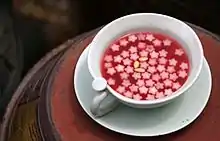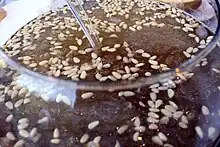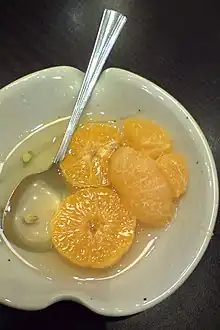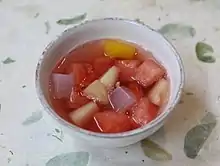Hwachae
Hwachae (화채; 花菜) is a general term for traditional Korean punches, made with various fruits or edible flower petals. The fruits and flowers are soaked in honeyed water or honeyed magnolia berry juice.[1][2][3] In modern South Korea, carbonated drinks and fruit juices are also commonly added to hwachae.[4][5] Hwachae is often garnished with pine nuts before it is served.
 Omija-hwachae (magnolia berry punch) | |
| Type | Punch |
|---|---|
| Place of origin | Korea |
| Associated cuisine | Korean cuisine |
| Similar dishes | Sudan |
| Korean name | |
| Hangul | 화채 |
|---|---|
| Hanja | 花菜 |
| Revised Romanization | hwachae |
| McCune–Reischauer | hwach'ae |
| IPA | [hwa.tɕʰɛ] |
Types
It is said that there are around thirty types of traditional hwachae.[2]
Fruit

Bae-hwachae (pear punch)

Milgam-hwachae (citrus punch)

Subak-hwachae (watermelon punch)
- Aengdu-hwachae (앵두화채; "cherry punch") – made with Korean cherries and honeyed water.[6] It is associated with Dano, the fifth day of the fifth lunar month.
- Bae-hwachae (배화채; "pear punch") – made with flower-shaped pieces of Korean pear and honeyed magnolia berry juice.[6]
- Boksunga-hwachae (복숭아화채; "peach punch") – made with peach preserved in honey and sugared water.[1]
- Chamoe-hwachae (참외화채; "melon punch") – made with Korean melon slices, cherries, celery slices, and honeyed magnolia berry juice.
- Cheondoboksunga-hwachae (천도복숭아화채; "nectarine punch") – made with nectarine preserved in honey and sugared water.
- Milgam-hwachae (밀감화채; "citrus punch") – also called gyul-hwachae (귤화채); made with citrus fruit—usually summer orange— pieces, in the fruit's juice mixed with lemon juice, sugar, and water.[6] It is a local specialty of Jeju Island, where summer oranges and most other citrus fruits are cultivated.[7]
- Mogwa-hwachae (모과화채; "quince punch") – made with Chinese quince slices preserved with hardy mandarin slices in sugar and honeyed water, consumed after 20 days.
- Omija-hwachae (오미자화채; "magnolia berry punch") – made with honeyed magnolia berry juice and decorative slices of Korean pear.
- Podo-hwachae (포도화채; "grape punch") – made with peeled grape boiled in sugared water, cherries, and honeyed water.
- Sagwa-hwachae (사과화채; "apple punch") – made with flower-shaped pieces of apple and honeyed magnolia berry juice.
- Sansa-hwachae (산사화채; "hawthorn punch") – made with jellied mountain hawthorn, called sansa-pyeon, sliced and floated in honeyed water.
- Sanddalgi-hwachae (산딸기화채; "raspberry punch") – made with Korean raspberries and honeyed water. It is associated with Yudu, the fifteenth day of the sixth lunar month.
- Subak-hwachae (수박화채; "watermelon punch") – made with scooped or sliced watermelon pieces, bits of other fruits, ice cubes, and honeyed watermelon juice. It is a popular summertime refreshment.[5][8]
- Ddalgi-hwachae (딸기화채; "strawberry punch") – made with strawberries.[1]
- Yuja-hwachae (유자화채; "yuja punch") – made with yuja and Korean pear, both thinly julienned, and pomegranate and honeyed water.[1]
Flower
Flower petals are coated with mung bean starch and blanched, cooled in ice water, and drained before being put in hwachae.[1] Flower hwachae is usually topped with pine nuts.
- Jangmi-hwachae (장미화채; "rose punch") – made with rose petals and honeyed magnolia berry juice.[1]
- Jindallae-hwachae (진달래화채; "rhododendron punch") – made with Korean rhododendron petals and honeyed magnolia berry juice.[6] It is associated with Samjinnal, the third day of the third lunar month.[2]
- Songhwa-hwachae (송화화채; "pine pollen punch") – also called songhwa-su (송화수) or songhwa-milsu (송화밀수); made with dried pollen of Korean red pine and honeyed water.[6] It is a local specialty of Gangwon Province.
- Sunchae-hwachae (순채화채; "water-shield punch") – made with water-shield leaves and honeyed water or honeyed magnolia berry juice.
See also
Wikimedia Commons has media related to Hwachae.
- Baesuk – boiled pear punch
- Sikhye – rice punch
- Songhwa-milsu — traditional drink made of pine flower pollen (songhwa) and honey.
- Sudan – grain cake punch
- Sujeonggwa – cinnamon punch
References
- "Kind of Eumcheongryu: Hwachae (Honeyed juice mixed with fruits)". Food in Korea. Korea Agro-Fisheries Trade Corporation. Archived from the original on 15 April 2009. Retrieved 21 May 2008.
- Yoon, Sook-ja (Summer 2005). "Hwachae: Refreshing Beverages to Beat the Summer Heat" (PDF). Koreana. No. 19. pp. 76–79. Archived from the original (PDF) on 3 March 2016. Retrieved 25 April 2013.
- Jung, Alex (13 July 2017). "Best Korean drinks -- from banana milk to hangover juice". CNN Travel. Retrieved 4 August 2017.
- Goh, Kenneth (20 December 2015). "Toast the festive season: Five cocktail recipes". The Straits Times. Retrieved 4 August 2017.
- Ro, Hyo-sun (18 July 2014). "Hwachae (Korean traditional fruit punch)". The Korea Herald. Retrieved 4 August 2017.
- "Hwachae" 화채. Doopedia (in Korean). Doosan Corporation. Retrieved 4 August 2017.
- Kim, Dakota (4 August 2015). "5 Cooling Korean Punches to Soothe Your Heat Stroke". Paste. Retrieved 4 August 2017.
- Lee, Christine (20 July 2017). "Beat the summer heat with a Korean-styled watermelon punch — subak hwachae". The Daily Californian. Retrieved 4 August 2017.
This article is issued from Wikipedia. The text is licensed under Creative Commons - Attribution - Sharealike. Additional terms may apply for the media files.